They were eavesdropped on, followed, surrounded by secret collaborators, censored works ... The range of measures applied by the SB against communist artists was much wider than you would have imagined. Has your favorite singer been followed too? Was dirt collected on the people whose music you grew up with?
Popular, adored, admired by hundreds of thousands of young people. Mentally, and sometimes materially, independent. Often going abroad. Having access to the local culture:music, newspapers, books, films. Performing in the West and earning "real money".
No wonder that artists in the People's Republic of Poland were the subject of special interest from the Security Service.
Blackmail, threats and… belief in socialism
The most frequently used method of surveillance was simply to enlist the artist - singer, musician, actor - as a secret collaborator. It was done in various ways:by persuasion, bribery, blackmail, threats. Some broke and signed a commitment to cooperate, others did it out of conviction, others - for a specific material reward.
The popular actor Maciej Damięcki, caught in 1973 driving a car under the influence of alcohol in order not to lose his driving license, agreed to report to the SB. According to his file, he told officers about his fellow actors, including Gustaw Holoubek, Piotr Fronczewski, Daniel Olbrychski and Marek Kondrat. Damięcki did not receive money for cooperation, but gifts - for example expensive alcoholic drinks.
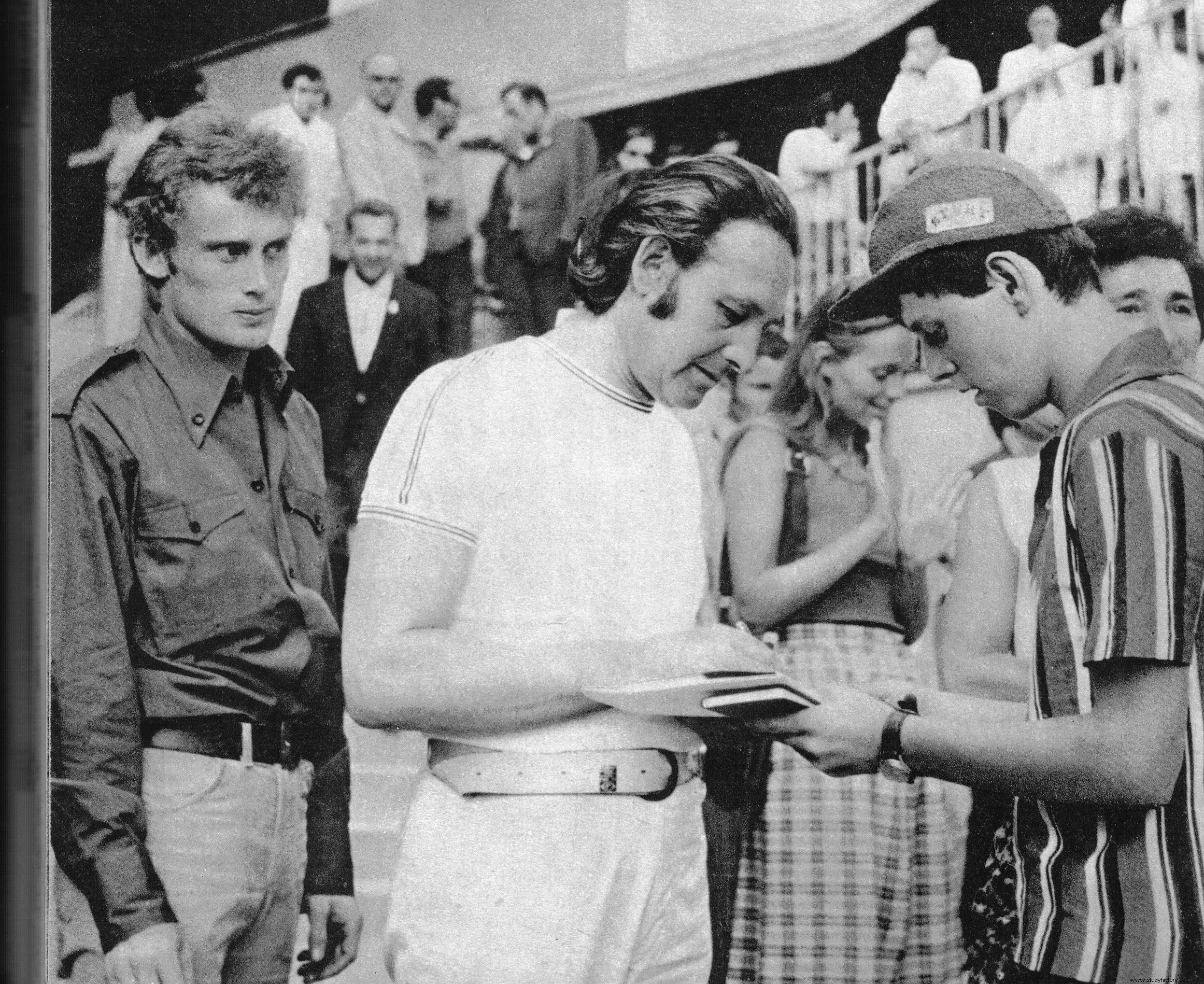
Forced by blackmail to cooperate with SB, Damięcki told agents about his colleagues, including Daniel Olbrychski. In the photo is standing on the left, next to Andrzej Wajda.
Another - famous recently - example is the collaboration with the SB of the famous actor Jerzy Zelnik. He signed a commitment to cooperate in the early 1960s, and he was acquired ... on a voluntary basis. In one of his statements, Zelnik stated that at that time he believed that he was behaving as necessary when cooperating with the SB, because he deeply believed in the socialist system ...
Managers and managers are former Esbek plugins
A practical way to keep an eye on artists, mainly musicians, was to surround them with people who collaborated with the Security Service, for example managers, supervisors or music managers. As in the book "Krzysztof Klenczon. The story of one acquaintance ”, tells Alicja Klenczon, wife of the leader of Czerwony Gitar:
everyone knew managers and managers were esbecki plugins, and on top of that they were doing their own business to earn money for their wives and other family members . But in that system there had to be someone with the band who was good at music and party arrangements.
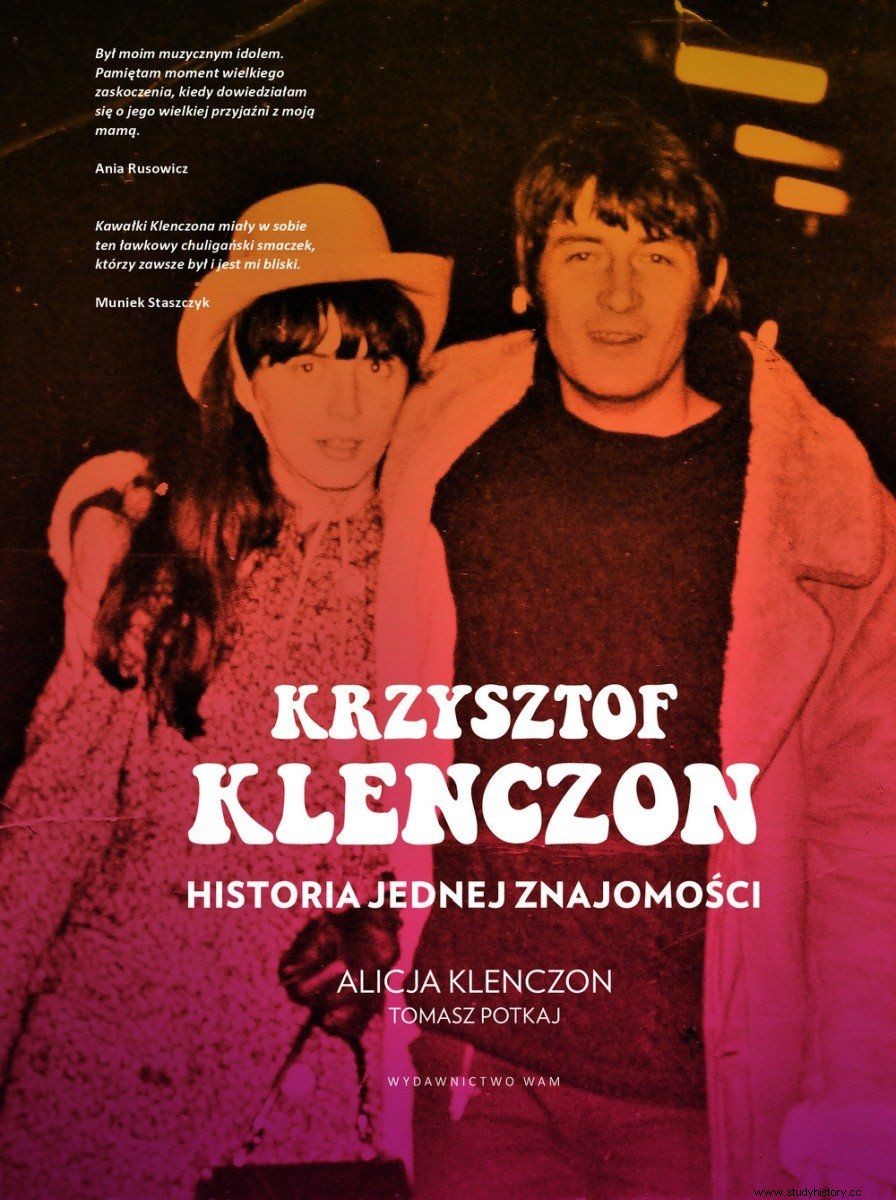
The article is based on, among others, the book by Alicja Klenczon and Tomasz Potkaaj entitled “Krzysztof Klenczon. The story of one acquaintance "(WAM Publishing House 2017).
In the case of Czerwony Gitar, it was the manager Jan Górecki from the Warsaw Estrada. “He knew several languages and organized most of the Red Guitar tours abroad (…). Górecki knew how to talk to people and there was practically no problem that he was unable to settle. We suspected that he had some connection with the SB or intelligence. Górecki knew everyone in Pagarta, where it was decided who would go on a tour abroad. And everyone wanted to ride because the money was the best ”, remembers Alicja Klenczon.
But you needed a passport to leave. Its release depended on the goodwill of the authorities. It was one of the most important elements of social control in the People's Republic of Poland, but also a tool for blackmailing and rewarding individuals.
People with a hook in their biographies could not count on receiving the coveted blue book with an eagle on the cover. This was the case with Alicja Klenczon, who was repeatedly refused a passport, and for nine years she could not see her parents who emigrated to the USA.
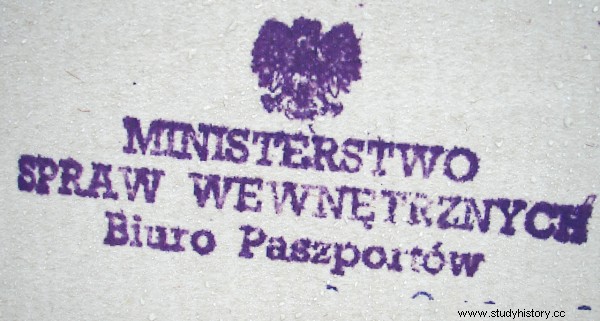
With a hook in my curriculum vitae, it was impossible to count on a positive approval of the passport application.
Musician in boots
A method often used by the authorities to control and punish rebellious artists was ... consigning them to the army. Young musicians who had not yet fulfilled their honorable duty in the military were appointed to the ranks regardless of the requests and justifications that they were needed in their bands.
This was the situation of the musician of the Red Guitars, Henryk Zomerski, who had to hide even for this reason. As Alicja Klenczon reports in the aforementioned book, Zomerski did not go to concerts by bus with his friends, but traveled by his own car - a mermaid - and played bass ... hidden in a large box. He also appeared under the fictitious name of Janusz Horski.
He was in love with a girl his mother didn't approve of. So she informed WKU where to find her son. “Eventually they took him into the army. It happened in Dom Chłopa in Warsaw, right before my eyes. The Military Police came for him and they just took him from the bus in their boots ", says Alicja Klenczon.

A proven way of the people's government to control rebellious artists was to send them in boots.
Klenczon avoids the military
Conscription also threatened Krzysztof Klenczon, but his father, using his connections at WKU, arranged for him to postpone. Later, the doctor awarded him health category D, which he was exempt from military service. Needless to say, the young musician was actually in great health.
“My father-in-law had extensive contacts. He knew the head of the hospital, pharmacist, and party secretary. Krzysztof blackmailed his father that if they put him in boots, he would commit suicide ", the artist's wife cheats in the book. Jerzy Kossel of the Blue-Blacks, who served in the Polish "People's Army" for two years (as a librarian, but still), did not avoid conscription.
Pocket punch
An effective method of blackmailing artists in the People's Republic of Poland were activities influencing their material status. In those days, writers, poets, painters and musicians remained practically on the state pot. When the authorities decided that the creator was not behaving properly, then - colloquially speaking - he was given a pocket.
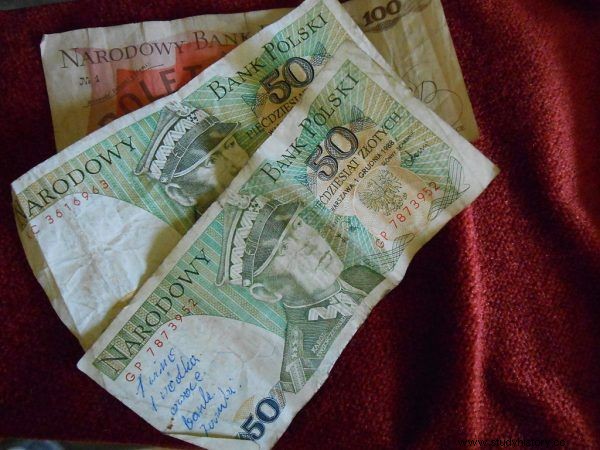
Hitting artists in the pocket was a very effective way to sharpen them.
Musicians were banned from touring or - in a milder version - banned from lucrative foreign concerts. CDs were forbidden to be released or their circulation was severely reduced, radio and television broadcasting of songs was blocked, and the publication of interviews was forbidden.
Such treatment was faced by rebellious rock bands in the 1980s, such as KSU, Kobranocka, Kult or Tzn Xenna. There were many more ways to harass bands. Censorship heavily interfered with the texts, demanding changes or rejecting some of them. For example, part of the release of the single Dezerter, recorded in 1983, entitled "Towards the Future" was destroyed precisely as a result of censorship intervention.
The authorities did not like some of the band names as well. At the beginning of the 1980s, the famous Brygada Kryzys was offered to play a series of concerts - on condition that ... it would change its name to Brygada K.

The article is based on, among others, the book by Alicja Klenczon and Tomasz Potkaaj entitled “Krzysztof Klenczon. The story of one acquaintance "(WAM Publishing House 2017).
Dangerous Festivals
Separate supervision covers "dangerous" musical events, especially the famous (literally and figuratively) rock festival in Jarocin. On the one hand, it was a safety valve that channeled the rebellious and non-conformist moods of young people. The authorities considered the music-related activity of young people to be "less evil than opposition, political and religious activities."
On the other hand, Jarocin was considered a dangerous phenomenon and - in the absence of control - could have a detrimental effect on the "healthy" part of young people. Therefore, the festival was put under "protection", which included, inter alia, the activity of official youth organizations, censorship of texts and surveillance of participants. The militia and SB prepared detailed reports from each Jarocin.
The same was done with other musical events of this type. According to the researchers of the Institute of National Remembrance, one of the ways to pacify the festivals were performances by bands known and accepted by the authorities. However, when Lombard, Republika and Wanda refused to play at one of such events, they were not allowed to travel abroad as a result of repression and the broadcasting of their works on radio and television was restricted.
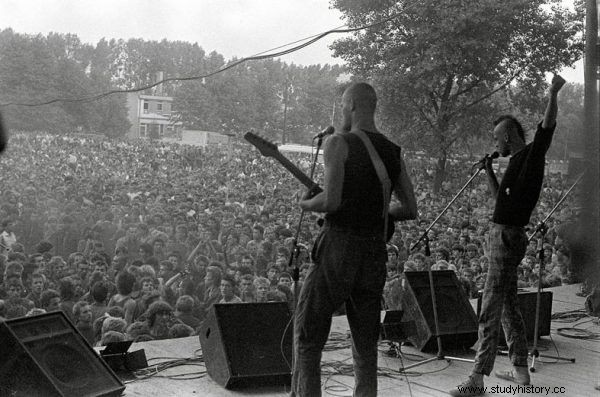
The festival in Jarocin was supposed to be a safety valve. Security, however, did not have to know exactly what was going on there. The photo shows the band Siekiera on stage in Jarocin.
To be or not to be
The rebellious writers and poets were treated in a similar way. They were withdrawn from creative scholarships, no passports were given, the circulation of books was reduced or their publishing was completely forbidden. And if they miraculously came out, the libraries were instructed not to buy them.
In the People's Republic of Poland, such treatment was experienced by many opposition-minded people, to mention only Paweł Jasienica, Tadeusz Konwicki or the poets of the New Wave from the turn of the 1960s and 1970s, including Adam Zagajewski and Stanisław Barańczak. In extreme cases, the collapse of power meant not only a lack of livelihood, but also disappearance from public circulation.
Stasi will help!
In the difficult work of surveillance of artists, the Security Service sometimes had to resort to the help of comrades from the fellow socialist countries. For example, in 1983, the Polish Ministry of the Interior handed over to the East German Stasi a list of Polish artists who should be under surveillance.
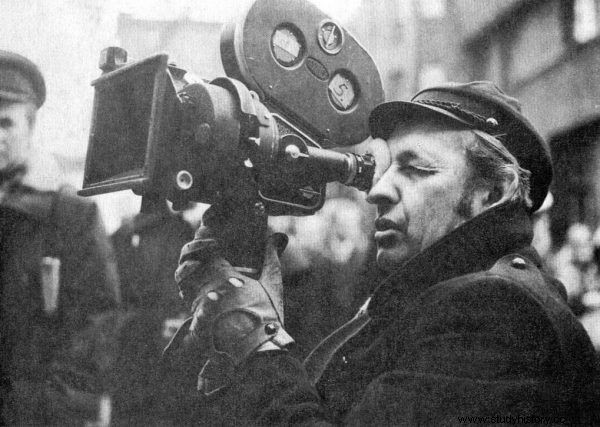
Andrzej Wajda was on the list of people who, at the request of the Polish security services, was to be under surveillance by the Stasi.
Among them were:singer Izabela Trojanowska, director Andrzej Wajda and actress Krystyna Janda, as well as writers - Tomasz Jastrun, Antoni Libera and Marek Nowakowski. The German Security Service was strongly afraid of the contacts between Polish artists and Germany. The idea was that the intellectual elites from the Vistula River would not try to instill in eastern Germany the subversive ideas of "Solidarity".
How did such surveillance look like in practice? During their stays in the territory of the GDR or West Germany, where the Stasi also had its agents, secret collaborators appeared around the Polish artists. Polish artists were also subject to searches when crossing German borders.
As you can see, being an artist in the People's Republic of Poland was not all about the pleasures. The artists of that time had to answer the question of whether they wanted to obey the authorities and take advantage of the resulting profits, or expose themselves to harassment and surveillance. The choice was theirs.
Bibliography:
- Alicja Klenczon, Tomasz Potkaj, Krzysztof Klenczon. The story of one acquaintance , WAM Publishing House, Krakow 2017.
- Creators on duty. At the service of creativity , edited by Sebastian Ligarski, IPN, Warsaw 2013.
- Joanna Siedlecka, Code name "Liryka". Safe against writers , Prószyński i Ska, Warsaw 2008.
Buy the book on Empik.com:

